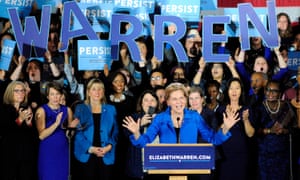Elizabeth Warren
Can Elizabeth Warren reclaim her role as Democrats’ top foil to Trump?
Warren will join a crowded field when she formally launches her campaign – but her entry will differ sharply from the enthusiasm surrounding her Senate bid seven years ago

Photograph: Joseph Prezioso/AFP/Getty Images
Despite the years that have since passed, many of Elizabeth Warren’s former students at Harvard Law School share the same distinct memory: it was their very first day at the prestigious institution, and for many, their very first class.
Not knowing what to expect, they took their seats for an introductory course on contracts law. At the exact minute that the clock struck the top of the hour, Warren bounded into the room and rested her casebook on the podium.
“I’m Elizabeth Warren. This is contracts,” she said.
But whereas other professors had prepared a welcome speech, Warren’s pleasantries ended there. Glancing down at her seating chart, she proceeded to cold-call on the students with queries stemming from their reading material, making her way through at least half the room by the time the class was over.
Years later, when clips of Warren grilling corporate CEOs and cabinet officials from the US Senate went viral, her former students would fire off emails and texts to one another joking about what it was like to be at the receiving end.
“We could all empathize with the witness in the hot seat,” said Andrew Crespo, a former student of Warren’s who is an associate professor at Harvard.
“She was rigorous, thoughtful, careful, precise … She had a big profile on campus.”
Warren’s tough teaching style was notorious across Harvard – always come prepared, her students recalled.
It is that same rigorous and methodical approach that Warren’s former colleagues expect her to bring to her bid for the Democratic party’s nomination for president in 2020. On Saturday, Warren, 69, will return to Massachusetts to formally launch her campaign for president after forming an exploratory committee in December.
It will be an event long in the making for the closely watched senator, whose meteoric rise from academia to politics brought with it relentless speculation over possible presidential ambitions.

In interviews throughout the Boston area, Warren’s former students and colleagues described her as a “pragmatic idealist” whose life’s work has centered on understanding and rooting out income inequality.
“She’s had a very consistent, coherent, intellectual ideological position,” said Barney Frank, a retired Massachusetts congressman who worked closely with Warren on financial reform.
“She can claim to have been there when this critique of economic inequality, and the systematic problems that exacerbate it, wasn’t fashionable.”
But Warren’s official entry into the race has differed sharply from when she captured widespread liberal enthusiasm in her unlikely bid for the Senate seven years ago.
The two-term senator will join a crowded Democratic primary field with no clear frontrunner – and several contenders jockeying to claim the progressive mantle that she aspires to grasp. She has also found herself contending with a lingering controversy for previously identifying as Native American over the course of nearly two decades.
The question now is whether Warren, who moved early to build an expansive field operation in anticipation of her presidential run, can overcome early setbacks and reclaim her role as the Democratic party’s top foil to Donald Trump.
Born to middle-class parents in Norman, Oklahoma, Warren has spoken candidly about how her family’s livelihood was upended when her father’s heart attack forced him out of work. Addressing crowds across the country, Warren often recalls how her late mother – determined not to lose the family’s home – “pulled on her best dress” and got her first paying job at the department store Sears.
The job paid minimum wage and exposed Warren firsthand to the topics that would later define her career: the power of corporations and the effects of bankruptcy on the American consumer.
Her research in bankruptcy law – and the impact on the average person’s medical bills, mortgage payments and other installments – led Warren to become a leading expert on the subject and rise in the academia world.
“These are the issues she still cares about,” said Charles Fried, a professor at Harvard Law School who helped recruit Warren to its faculty.
“I think she is extraordinary for this reason, that she got into politics because she cared about some issues. She didn’t get into politics because she wanted to be in office and then tried to figure out what issues she cared about.”
Warren cultivated a profile as a populist firebrand against the backdrop of the Great Recession, earning the ire of Wall Street by spearheading the creation of the Consumer Financial Protection Bureau – an agency established under the Obama administration as part of the Dodd-Frank financial reform bill of 2010.
Upon being passed over to head the agency she helped create, Warren decided to continue the fight from within the government, embarking on a campaign to win back the late senator and liberal icon Ted Kennedy’s seat from the Republican incumbent, Scott Brown, in the high-profile 2012 Massachusetts Senate race.
Roughly $70m was spent on the bitterly waged contest, which catapulted Warren to the national stage.

The race also saw Warren cement herself as a leader of the burgeoning progressive movement within the Democratic party; branding the choice before voters as “Wall Street versus you”, Warren viewed the election as an opportunity to hand a major defeat to what she once dubbed as “the largest lobbying force ever assembled on the face of the earth”.
Following her victory, Warren’s profile grew so rapidly that speculation swiftly emerged over a potential White House run in 2016, despite the inevitability of Hillary Clinton’s candidacy. A group of progressives even mounted a #DraftWarren campaign.
Warren, who had been sharply critical of Clinton in part over her ties to Wall Street, ultimately chose not to challenge her for the Democratic party’s nomination and endorsed the former secretary of state’s campaign. It was also during this time that Warren proved among the few capable of getting under then candidate Donald Trump’s skin.
After Trump derided Clinton as a “nasty woman”, Warren famously riffed: “Get this, Donald. Nasty women are tough, nasty women are smart and nasty women vote, and on November 8, we nasty women are going to march our nasty feet to cast our nasty votes to get you out of our lives forever.”
The 2016 presidential election did not, however, produce the groundswell of unified opposition to Trump that Democrats had hoped for. Instead, it left the party in search of a clear leader to fill the void left by Obama’s departure from the White House.
For Warren, it looked as though her moment had arrived.
In the early days of the Trump administration, Warren quickly emerged as the face of the Democratic opposition, matching the president’s tweets with sharp ripostes of her own and holding his cabinet nominees to account when they appeared for consideration before congressional committees.
During the confirmation process for the former attorney general Jeff Sessions, Warren famously read a letter written 30 years prior by Coretta Scott King, in which the widow of Dr Martin Luther King Jr warned of Sessions’ civil rights record from the time of his nomination for a federal judgeship.
Silenced by Republicans mid-speech on the Senate floor, Warren read the letter on Facebook Live. The hashtag #LetLizSpeak trended on Twitter and the phrase “Nevertheless, she persisted” was coined.
At the same time, Warren became a top target of conservatives and Trump himself. The president has repeatedly mocked Warren with the derisive nickname “Pocahontas” – including at an event intended to honor Native Americans.
Although Warren long ignored the president’s taunts, she took the unusual step of addressing the issue head on in October by making public the results of a DNA test revealing that she did, in fact, have some Native American ancestry.
Rather than putting the topic to rest, Warren’s move was rebuked by some tribal leaders, who felt it politicized their identity, and reignited the story.
Republicans first tried to push the notion that Warren used her Native American ancestry to further her career in the 2012 Senate race, homing in on a single questionnaire in which she claimed mixed ancestry.
An exhaustive investigation by the Boston Globe found no evidence that Warren benefited from doing so, and nearly every living Harvard law professor involved in her hiring has said it was not a factor in their votes to offer her a tenured position.
“When we brought her to Harvard, no one had a clue that she thought of herself as Native American,” said Laurence Tribe, the school’s professor of constitutional law.
“I think she’s had an unfair rap,” he added. “I don’t think it’s the case that she ever exploited her family’s background or ancestry in a way that some people seem to think she did.”
The Cherokee nation, one of the groups that was critical of Warren, said she privately apologized to to tribal leaders.
But the matter did not end there. The Washington Post published a story revealing Warren listed her race as “American Indian” while seeking a Texas bar registration card in 1986.
Warren apologized once more, telling reporters: “I’m not a tribal citizen.
“My apology is an apology for not having been more sensitive about tribal citizenship and tribal sovereignty. I really want to underline the point, tribes and only tribes determine tribal citizenship.”
Warren remains a popular figure in the Democratic party and was easily re-elected to a second Senate term in the 2018 midterm elections.
Even so, she received fewer votes in her home state than Charlie Baker, the Republican governor of Massachusetts, prompting Warren’s hometown paper to urge the senator to reconsider a presidential bid.
“While Warren won re-election, her margin of victory in November suggests there’s a ceiling on her popularity,” the Boston Globe editorial board wrote. “Baker garnered more votes than she did in a state that is supposed to be a Democratic haven.”
“While Warren is an effective and impactful senator with an important voice nationally, she has become a divisive figure,” the board added. “A unifying voice is what the country needs now after the polarizing politics of Donald Trump.”
Those close to Warren dismissed the editorial as having more to do with the personal biographies and inclinations of those who sit on the board.
“She’s hard-edged, not personally, but ideologically,” said Frank. “She takes very sharp and controversial positions.”
“So, yeah, they’re going to be people who are unhappy with her.”
More challenging for Warren, friends and former colleagues said, would be the task of distinguishing herself within a diverse field of Democratic candidates that includes at least three of her Senate colleagues and a record number of women seeking the party’s nomination.
Warren’s platform includes the single-payer healthcare system Medicare for All, debt-free college tuition and anti-corruption legislation designed to restore accountability in government. She is also poised to unveil a proposal that would impose a wealth tax on Americans worth over $50m.
Fried, who served as solicitor general under Ronald Reagan, said he disagreed with some of the more expansive economic policies touted by Warren.
But her greatest asset as a candidate, he acknowledged, would be to approach the campaign with the same steely resolve to elevate the middle class that endeared her to voters seven years ago.
Although he is only occasionally in touch with Warren as she embarks on what will undoubtedly be a grueling campaign for America’s highest office, Fried recalled recently sending Warren a lengthy article about capitalism and income inequality.
To his surprise, he received a response from Warren 10 days later. She had not only taken the time to read the article, but highlighted a portion that stood out to her.
“How many presidential candidates would do that?” Fried asked.
In her email, Warren also recounted to her old colleague how not very long ago they sat together on a flight discussing the prospects of a Clinton presidency.
That day never came to fruition, Warren noted.
“I don’t know what lies ahead,” she added. “But I know what I’m fighting for.”
Source: Elections - theguardian.com



